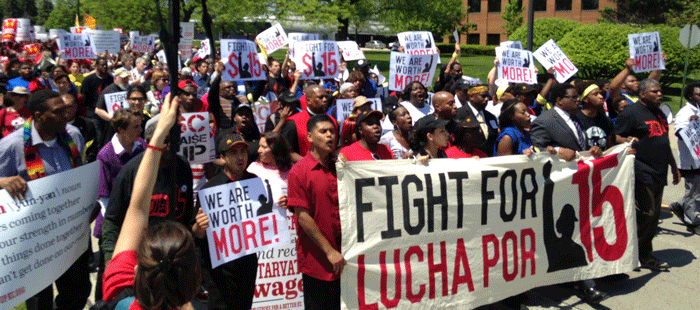Just who are the legislators protecting when they enact legislation that forbids local law making – law making that limits or bans corporate activities like fracking, GMOs, factory farms, retail proliferation of plastic bags or sewage sludge dumping?
Just who do the legislators represent when they preempt local laws – laws that set a higher minimum wage, establish sanctuary for immigrants, protect LGBTQ residents from discrimination, or secure workers’ rights on the job?
Rationalizing Preemption
State law-makers rationalize that these and many other issues are matters of state-wide concern. They claim these issues cannot be managed, regulated or governed by local jurisdictions.
Most of us, whether progressive or conservative, have difficulty challenging this claim. Sedimentary layers of case law have settled atop the inalienable right of local self-government, fossilizing it and preserving it as a quaint but extinct species of civil rights.
But “the state” (which is composed of powerful lobbyists working through bought politicians) acts presumptuously. It declares, in the name of residents across the state, that if a community decides to prohibit natural gas pipelines, set a higher minimum wage than the state, ban plastic bags, or allow transgender citizens to use public restrooms according to how they identify themselves, these things matter more to the people of the state as a whole than they do to the community that chooses to exercise self-governing authority locally.
Legitimate Preemption
“The state” can only legitimately declare an issue to be of state-wide concern and place it off limits for local governance when doing so actually protects, rather than violates, rights.
This same principle applies to local governments. Cities, towns, and counties may only enact laws prohibiting or protecting public behavior when those laws secure or enhance basic rights. This is the litmus test that has been forgotten or goes unused. It applies to all levels of government.
Instead of abiding by this principle, “the state” claims that regulation of industries – from fossil fuel, timber, and firearms, to agribusiness and waste management – is a matter of state-wide concern. It thus is not a concern of local community governments, argue corporate representatives.
Commandeering the Voice of the People
However, in doing so, “the state” presumes that when it “occupies the field” of regulation, it is acting in the name of the people of the state as a whole. In making that claim, “the state” also presumes that the people across the state will be offended or harmed if the people of a community employ their local government to enact laws regarding those industries.
Let’s sum that up. “The state” claims that setting higher local minimum wages, protecting minorities from discrimination, enacting police accountability policies, and adopting sustainable energy and agriculture policies, violate matters of state-wide concern. “The state” presumes that the people of the state as a whole oppose those local measures, and would be harmed if they are not quashed. Lastly, “the state” acts as if it – through the people’s state representatives – has been directed to obliterate such uppity behavior by mere communities of people.
Really? So why is it that when communities across the state opine that a certain corporate behavior would be offensive to the interests of their communities, “the state” still uses preemption to block local laws protecting the people from those activities? And let’s make it plural. It’s “the states,” since supersession and preemption have become so pervasively oppressive against self-governance by communities across the country.
An honest discussion about state preemption must answer this question: Does the preemption violate the right of self-government by the community? “The states” throughout the U.S. seem to have adopted a raw power-based standard for the exercise of preemption. State legislators, the courts, attorneys for municipalities, and corporate lawyers love to trot out Iowa judge John Forrest Dillon’s 1868 legal theory to support the unjustified enactment of preemptive statutes.
Dillon’s Rule: An Un-American Doctrine
Dillon’s Rule says that local governments are absolute wards of the state with no governing agency of their own. It’s a doctrine lacking in credibility, considering the goals and purposes of the American Revolution, which took seed and were rooted in town meetings, county assemblies, and community erected governments.
However, Dillon’s Rule is as un-American a doctrine as you can get. It has an imperial pedigree reaching back to the smug sense of superiority thought to have been rejected when communities came together as a confederacy of local governments. As members of that confederacy, they agreed to depart from colonial rule by the British Empire. As they seceded from the empire, those local communities fired off a list of grievances in the Declaration of Independence. They opened their damning indictment of the empire’s preemption of colonial self-government, asserting that all such oppression had “in direct object the establishment of an absolute tyranny… To prove this, let facts be submitted to a candid world.” And then those patriots began their list of grievances with this: “He [the king] has refused his assent to laws, the most wholesome and necessary for the public good.”
Modern Day Grievances
Today, we find ourselves facing similar grievances. Our state governments refuse their assent to local laws adopted by residents for the common good.
State preemption, when it interferes with the local government’s authority to protect the community’s health, safety, and welfare, is an intentional savaging of the inalienable right of the people to act collectively in the exercise of community self-governance. The state acts despotically: It pretends to be protecting the public interest by eliminating local self-determination when that self-determination interferes with the “private” interests of corporations.
The People Against Local Self-Government?
“The state” asserts that “state-wide interests” justify the obliteration of local democracy. It postulates a general sentiment among the people of the state, suggesting that they steadfastly stand in opposition to the exercise of local self-government. This claim has never been demonstrated. Further, it insults the whole of the people of the state when lawmakers dare mount tyrannies in their name.
“The state” regularly claims to speak for the people of the whole state as a justification for the deprivation of local governing rights. In doing so, “the state” treats the people it ostensibly serves not as sovereign masters, but as ventriloquist dummies for a hidden agenda.
Whatever the real agenda of remotely controlled lawmakers may be, they are commandeering the voice of the people, without their consent. They are usurping the people’s right to govern themselves without an ounce of legitimacy. Such actions are and always will be an affront to honesty, a besmirching of the character of the people, and proof of unfitness to govern.
The sole justification for the permanence of the states and the nation is that they serve the interests of the communities that established our state and federal governments. We – all Americans – are under assault by a tyranny within the states. We are suffering what the Declaration of Independence called “a long train of abuses and usurpations, pursuing invariably the same object [which] evinces a design to reduce [us] under absolute despotism.”
There can be no justification for further tolerating this transfiguration of government into mere dictatorship.
CELDF is working with communities across the country. We are building a movement for Community Rights and the Rights of Nature to advance democratic, economic, social, and environmental rights – and to stop unjust legal doctrines harming our communities. Join us.



